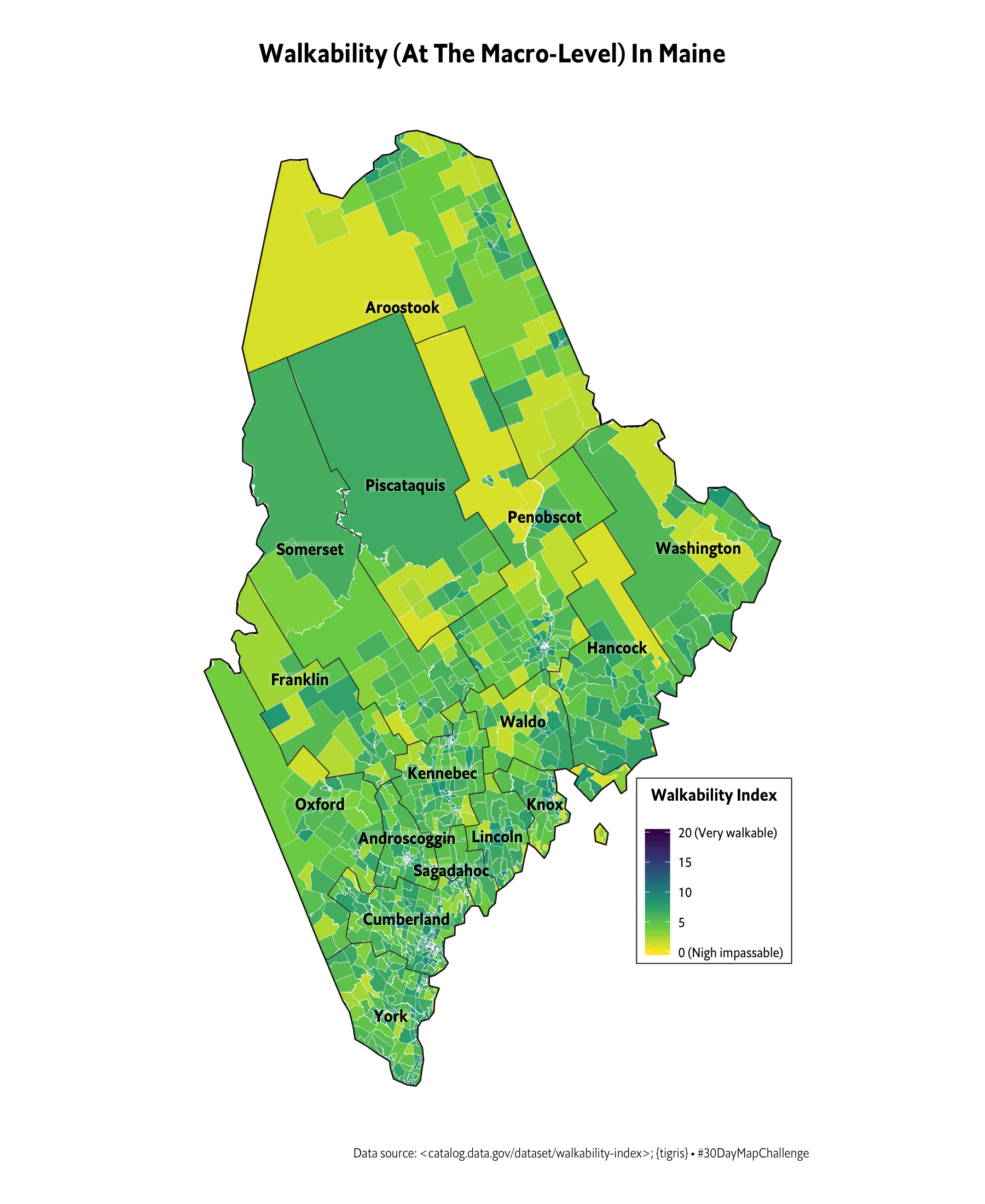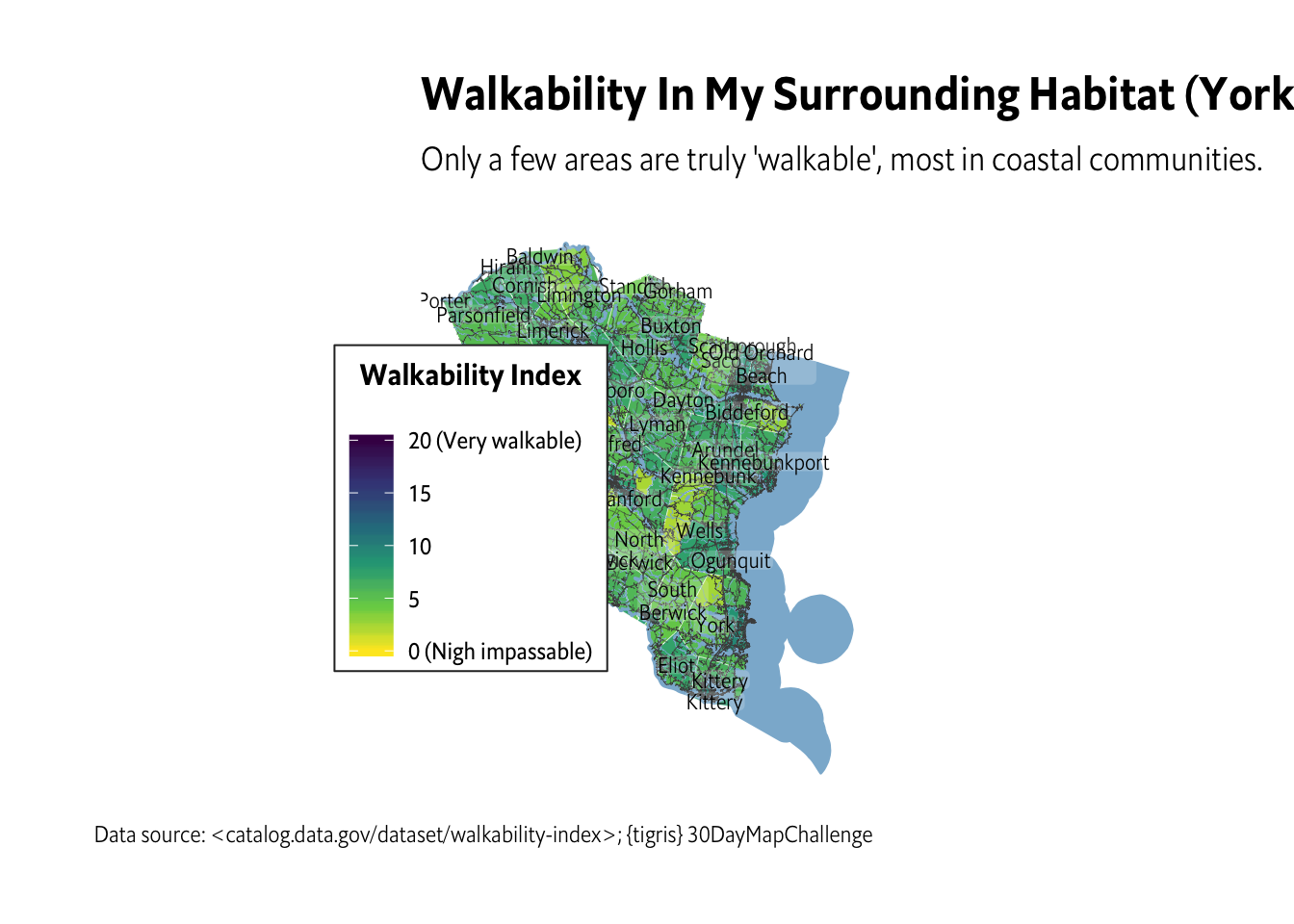24 Day 22: Built Environment
24.1 Technologies/Techniques
- More geodatabase machinations
- Working with
{tigris} - More work on stylizing maps
- Using
{sf}/geom_sf()
24.2 Data Source: EPA “Walkability” Data
# https://www.epa.gov/smartgrowth/smart-location-mapping#walkability
# https://catalog.data.gov/dataset/walkability-index
st_read(here::here("data/me-counties.json")) %>%
st_set_crs(4326) %>%
st_transform("+proj=longlat +datum=WGS84 +no_defs") -> maine
## Reading layer `cb_2015_maine_county_20m' from data source `/Users/hrbrmstr/books/30-day-map-challenge/data/me-counties.json' using driver `TopoJSON'
## Simple feature collection with 16 features and 10 fields
## geometry type: MULTIPOLYGON
## dimension: XY
## bbox: xmin: -71.08434 ymin: 43.05975 xmax: -66.9502 ymax: 47.45684
## epsg (SRID): NA
## proj4string: NA
filter(maine, NAME == "York") -> york
border <- st_union(maine)
if (!all(file.exists(here::here("data", c("me-walkies.rds", "york-walkies.rds"))))) {
download.file( # NOTE THIS IS ~1 GB uncompressed
url = "ftp://newftp.epa.gov/EPADataCommons/OP/WalkabilityIndex.zip",
destfile = here::here("data/WalkabilityIndex.zip")
)
unzip(
zipfile = here::here("data/WalkabilityIndex.zip"),
exdir = here::here("data/WalkabilityIndex")
)
# this may take a bit to read in
walkies <- st_read(here::here("data/WalkabilityIndex/Natl_WI.gdb/"), "WalkabilityIndex")
# find the maine walkability
me_walkies <- st_intersection(walkies, border)
# find just york county
york_walkies <- st_intersection(me_walkies, york)
# save our hard/time-consuming work
saveRDS(me_walkies, here::here("data/me-walkies.rds"))
saveRDS(york_walkies, here::here("data/york-walkies.rds"))
}
me_walkies <- readRDS(here::here("data/me-walkies.rds"))
york_walkies <- readRDS(here::here("data/york-walkies.rds"))
rivers <- linear_water(state = "ME", "York", class="sf")
water <- area_water(state = "ME", "York", class = "sf")
rd <- roads(state = "ME", "York", class = "sf")
st_read(here::here("data/me-topo.geojson")) %>%
st_set_crs(4326) %>%
st_transform("+proj=longlat +datum=WGS84 +no_defs") -> towns
## Reading layer `me' from data source `/Users/hrbrmstr/books/30-day-map-challenge/data/me-topo.geojson' using driver `TopoJSON'
## Simple feature collection with 985 features and 1 field
## geometry type: POLYGON
## dimension: XY
## bbox: xmin: -71.08015 ymin: 43.06516 xmax: -66.95141 ymax: 47.4599
## epsg (SRID): NA
## proj4string: NA
st_intersection(st_buffer(towns, 0), york) %>%
mutate(
id = as.character(id),
id = case_when(
id == "NorthBerick" ~ "North\nBerwick",
id == "SouthBerick" ~ "South\nBerwick",
id == "Sandford" ~ "Sanford",
id == "SacoCty" ~ "Saco",
id == "BiddefordCty" ~ "Biddeford",
id == "OldOrchardBeach" ~ "Old Orchard\nBeach",
TRUE ~ id
)
) -> york_towns24.3 Drawing the Map
ggplot() +
geom_sf(data = border, color = "black", size = 0.75, fill=NA) +
geom_sf(data = me_walkies, color = "white", size = 0.0725, aes(fill = WalkIndex)) +
geom_sf(data = maine, color = "#2b2b2b", size = 0.25, fill = NA) +
geom_sf_label(
data = maine, aes(label = NAME), family = font_es_bold, size = 4, lineheight = 0.875,
label.padding = unit(0.05, "lines"), label.size = 0, fill = "#ffffff33"
) +
scale_fill_viridis_c(
direction = -1, limits = c(0,20), name = "Walkability Index\n",
breaks = seq(0, 20, 5), labels = c("0 (Nigh impassable)", 5, 10, 15, "20 (Very walkable)")
) +
coord_sf(crs=albersusa::us_laea_proj, datum=NA) +
labs(
x = NULL, y = NULL,
title = "Walkability (At The Macro-Level) In Maine",
caption = "Data source: <catalog.data.gov/dataset/walkability-index>; {tigris} • #30DayMapChallenge"
) +
theme_ipsum_es(grid="") +
theme(plot.title = element_text(hjust = 0.5)) +
theme(legend.position = c(0.85, 0.25)) +
theme(legend.title = element_text(family = font_es_bold, hjust = 0.5)) +
theme(legend.box.background = element_rect(color = "#2b2b2b", fill = "white"))
ggplot() +
geom_sf(data = york_walkies, aes(fill = WalkIndex), color = "white", size = 0.1) +
geom_sf(data = water, fill = "#8cb6d3", color = "#8cb6d3") +
geom_sf(data = rivers, size = 0.1, color = "#8cb6d3") +
geom_sf(data = rd, size = 0.1, color = "#4c4c4c") +
geom_sf_label(
data = york_towns, aes(label = id), family = font_es_light, size = 3, lineheight = 0.875,
label.padding = unit(0.05, "lines"), label.size = 0, fill = "#ffffff33"
) +
scale_fill_viridis_c(
direction = -1, limits = c(0,20), name = "Walkability Index\n",
breaks = seq(0, 20, 5), labels = c("0 (Nigh impassable)", 5, 10, 15, "20 (Very walkable)")
) +
coord_sf(crs=albersusa::us_laea_proj, datum=NA) +
labs(
x = NULL, y = NULL,
title = "Walkability In My Surrounding Habitat (York County, Maine)",
subtitle = "Only a few areas are truly 'walkable', most in coastal communities.",
caption = "Data source: <catalog.data.gov/dataset/walkability-index>; {tigris} 30DayMapChallenge"
) +
theme_ipsum_es(grid="") +
theme(legend.position = c(0.11, 0.5)) +
theme(legend.title = element_text(family = font_es_bold, hjust = 0.5)) +
theme(legend.box.background = element_rect(color = "#2b2b2b", fill = "white"))